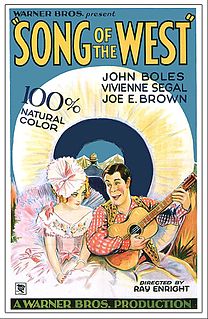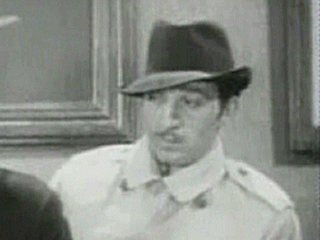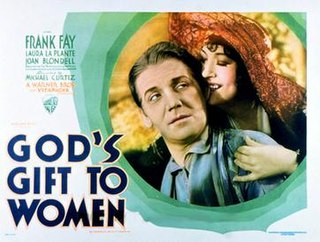
Yankee Doodle Dandy is a 1942 American biographical musical film about George M. Cohan, known as "The Man Who Owned Broadway". It stars James Cagney, Joan Leslie, Walter Huston, and Richard Whorf, and features Irene Manning, George Tobias, Rosemary DeCamp, Jeanne Cagney, and Vera Lewis. Joan Leslie's singing voice was partially dubbed by Sally Sweetland.

Claudia Dell was an American showgirl and actress of the stage and movies.

Gold Diggers of Broadway is a 1929 American pre-Code musical comedy film directed by Roy Del Ruth and starring Winnie Lightner and Nick Lucas. Distributed by Warner Bros., the film is the second all-talking, all-Technicolor feature-length film.

On with the Show! is a 1929 American musical film produced by Warner Bros. Filmed in two-color Technicolor, the film is noted as the first all-talking, all-color feature length film, and the second color film released by Warner Bros.; the first was the partly color, black-and-white musical The Desert Song (1929).

Hold Everything is a 1930 American Pre-Code film. It was the first musical comedy film to be released that was photographed entirely in early two-color Technicolor. It was adapted from the DeSylva-Brown-Henderson Broadway musical of the same name that had served as a vehicle for Bert Lahr and starred Winnie Lightner and Joe E. Brown as the comedy duo. The romantic subplot was played by Georges Carpentier and Sally O'Neil. Only three songs from the stage show remained: "You're the Cream in My Coffee", "To Know You Is To Love You", and "Don't Hold Everything". New songs were written for the film by Al Dubin and Joe Burke, including one that became a hit in 1930: "When The Little Red Roses Get The Blues For You". The songs in the film were played by Abe Lyman and his orchestra.

The Show of Shows is a 1929 American pre-Code musical revue film directed by John G. Adolfi and distributed by Warner Bros. The all talking Vitaphone production cost $850,000 and was shot almost entirely in Technicolor.

Song of the West (1930) is an American Pre-Code musical operetta film produced by Warner Bros., and photographed entirely in Technicolor. It was based on the 1928 Broadway musical Rainbow by Vincent Youmans (music), Oscar Hammerstein II (lyrics) and Laurence Stallings (book). It starred John Boles, Joe E. Brown and Vivienne Segal, and was the first all-color all-talking feature to be filmed entirely outdoors.

The Life of the Party is a 1930 American Pre-Code musical comedy filmed entirely in Technicolor. The musical numbers of this film were cut out before general release in the United States because the public had grown tired of musicals by late 1930. Only one song was left in the picture. The complete film was released intact in countries outside the United States where a backlash against musicals never occurred.

The Stolen Jools is a 1931 American pre-Code comedy short produced by the Masquers Club of Hollywood, featuring many cameo appearances by film stars of the day. The stars appeared in the film, distributed by Paramount Pictures, to raise funds for the National Vaudeville Artists Tuberculosis Sanitarium. The UCLA Film and Television Archive entry for this film says—as do the credits—that the film was co-sponsored by Chesterfield cigarettes to support the "fine work" of the NVA sanitarium.

Winnie Lightner was an American stage and motion picture actress. Perhaps best known as the man-hungry Mabel in Gold Diggers of Broadway (1929), Lightner was often typecast as a wise-cracking gold-digger and was known for her talents as a comedian and singer. She is also noted for introducing the song "Singin' in the Bathtub" in the 1929 motion picture The Show of Shows.

Gold Dust Gertie is a 1931 American Pre-Code musical comedy produced and released by Warner Brothers. It was originally completed as a full musical. Due to the backlash against musicals, however, all the songs were cut from the film in all release prints in the United States. The film was originally known as Red Hot Sinners, but was released as Gold Dust Gertie after the musical numbers had been cut. The film was based on the play The Wife of the Party by Len D. Hollister. The film stars Winnie Lightner, Ole Olsen, Chic Johnson and Claude Gillingwater.

Kiss Me Again is a 1931 American Pre-Code musical operetta film filmed entirely in Technicolor. It was originally released in the United States as Toast of the Legion late in 1930, but was quickly withdrawn when Warner Bros. realized that the public had grown weary of musicals. The Warner Bros. believed that this attitude would only last for a few months, but, when the public proved obstinate, they reluctantly re-released the film early in 1931 after making a few cuts to the film.

Manhattan Parade is a 1931 American pre-Code musical comedy film photographed entirely in Technicolor. It was originally intended to be released, in the United States, early in 1931, but was shelved due to public apathy towards musicals. Despite waiting a number of months, the public proved obstinate and the Warner Bros. reluctantly released the film in December 1931 after removing all the music. Since there was no such reactions to musicals outside the United States, the film was released there as a full musical comedy in 1931.

Fifty Million Frenchmen is a 1931 American pre-Code musical comedy film directed by Lloyd Bacon. It was photographed entirely in Technicolor. The film was produced and released by Warner Brothers, and was based on Cole Porter's 1929 Broadway musical Fifty Million Frenchmen.

Side Show is a 1931 American pre-Code musical comedy drama film directed by Roy Del Ruth and starring Winnie Lightner, Charles Butterworth, Evalyn Knapp and Donald Cook. It was produced and released by Warner Bros. The film was based on a story by William K. Wells. Although it was planned and filmed as a full-scale musical, most of the songs were cut from the film before release due to the public tiring of musicals.

God's Gift to Women is a 1931 American pre-Code romantic musical comedy film directed by Michael Curtiz, starring Frank Fay, Laura LaPlante, and Joan Blondell. The film, based on the play The Devil Was Sick by Jane Hinton, was originally completed as a musical film; however, because of audience dislike for musicals at that time, all the songs were cut in American prints. The full film was released intact in other countries, where there was no such decline in popularity.

Sunny is a 1930 American all-talking Pre-Code musical comedy film directed by William A. Seiter and starring Lawrence Gray, O. P. Heggie, and Inez Courtney. It was produced and released by First National Pictures. The film was based on the Broadway stage hit, Sunny, produced by Charles Dillingham, which played from September 22, 1925, to December 11, 1926. Marilyn Miller, who had played the leading part in the Broadway production, was hired by Warner Brothers to reprise the role that made her the highest-paid star on Broadway.

Going Wild is a 1930 Warner Brothers Pre-Code comedy film, based on the 1910 play The Aviator by James Montgomery, and directed by William A. Seiter. The film stars a bevy of musical stars in addition to the three comic stars, Joe E. Brown, Frank McHugh and Johnny Arthur. The flying sequences are the highlight of the film.

Big Boy is a 1930 American Pre-Code musical comedy film produced by Warner Bros. The film was directed by Alan Crosland and stars Al Jolson, Claudia Dell, Louise Closser Hale, and Noah Beery. The film is based on the 1925 Broadway hit show of the same name in which Jolson also starred.

Children of Dreams is a 1931 American pre-Code musical operetta drama film photographed entirely in Part Technicolor and produced and distributed by Warner Bros.




















